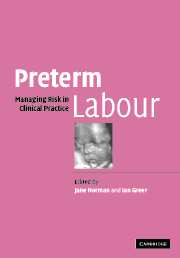Book contents
- Frontmatter
- Contents
- Contributors
- Preface
- 1 The epidemiology of preterm labour and delivery
- 2 Biology of preterm labour
- 3 Transcriptional regulation of labour-associated genes
- 4 Fetal outcome following preterm delivery
- 5 The prediction of preterm labour
- 6 Prevention of preterm labour
- 7 Management of preterm premature ruptured membranes
- 8 Management of threatened preterm labour
- 9 Management of preterm labour with specific complications
- 10 Anaesthetic issues in preterm labour, and intensive care management of the sick parturient
- 11 Management of the preterm neonate
- 12 Organisation of high risk obstetric and neonatal services
- 13 The management of pregnancy and labour
- 14 Treating the preterm infant – the legal context
- Index
- References
14 - Treating the preterm infant – the legal context
Published online by Cambridge University Press: 07 August 2009
- Frontmatter
- Contents
- Contributors
- Preface
- 1 The epidemiology of preterm labour and delivery
- 2 Biology of preterm labour
- 3 Transcriptional regulation of labour-associated genes
- 4 Fetal outcome following preterm delivery
- 5 The prediction of preterm labour
- 6 Prevention of preterm labour
- 7 Management of preterm premature ruptured membranes
- 8 Management of threatened preterm labour
- 9 Management of preterm labour with specific complications
- 10 Anaesthetic issues in preterm labour, and intensive care management of the sick parturient
- 11 Management of the preterm neonate
- 12 Organisation of high risk obstetric and neonatal services
- 13 The management of pregnancy and labour
- 14 Treating the preterm infant – the legal context
- Index
- References
Summary
Introduction
The delivery of a preterm infant can produce some of the most difficult practical challenges in obstetric and paediatric practice, amply illustrated by other chapters in this book. However, these practical challenges must at the same time proceed with consideration for the perhaps even greater challenge of deciding whether what can be done, should be done. Ordinarily, as explained in the previous chapter, decisions about acceptable medical care are expected to be taken in partnership between patients and their healthcare team, with patients setting limits on the care that they would find acceptable and that which they do not feel would be appropriate for them. Where decisions must be made on behalf of others, in this case premature babies, deciding what interventions should be attempted and when treatment should be discontinued needs the utmost care and transparency, since we cannot appeal to respecting the autonomous wishes of the individual as the touchstone for commencing or ceasing treatment.
When making such decisions, there is an inevitable tension between the desire to do everything possible to save the life of a vulnerable new person and the equally strong desire to avoid causing pain and distress or allowing suffering to continue without prospect of improvement. The way in which these sometimes opposing convictions are resolved is through attempting to weigh up the relative burdens and benefits of treatment to the child and reaching a conclusion on what course of action will cause the child the greatest benefit or the least harm.
- Type
- Chapter
- Information
- Preterm LabourManaging Risk in Clinical Practice, pp. 364 - 396Publisher: Cambridge University PressPrint publication year: 2005



